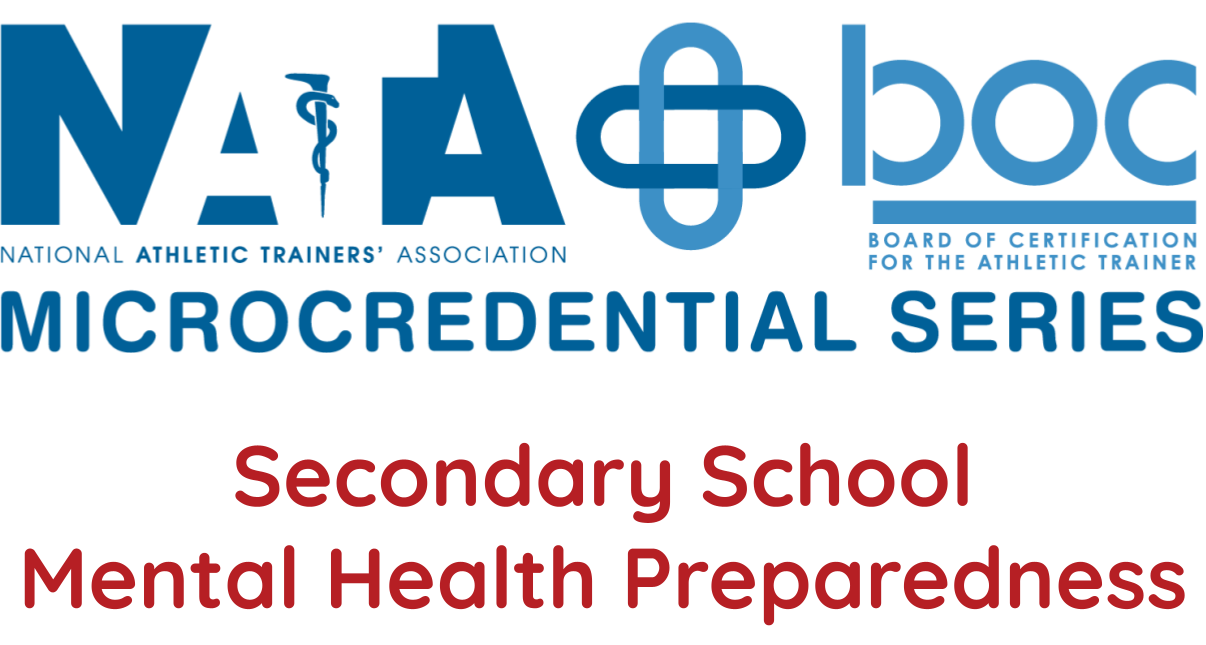
It's Not Just Physical: How Can Athletic Trainers Assist with Improving Mental Health Care for Student Athletes?
-
Register
- Non-member - $25
- Member - Free!
- Student - Free!
- Staff - Free!
- Certified Student - Free!
- Retired - $15
THIS PRESENTATION IS A REPLAY FROM NATA 2019 IN LAS VEGAS, OFFERING A SECOND CHANCE TO EXPERIENCE THE EVENT'S VALUABLE CONTENT AND INSIGHTS.
Abstract:
There is a growing prevalence of mental health conditions among young adults in the US. In addition to this, there is evidence to suggest an increased risk of injury in individuals suffering from mental health conditions. The age of onset for psychotic disorders typically encompasses the collegiate age range and rarely appears before. As primary healthcare providers It is imperative that athletic trainers are prepared and educated on common mental illnesses, signs and symptoms and have a rehearsed action plan for referral and intervention. Many athletic trainers do not receive training on the management of mental health conditions as part of their foundational education and therefore are lacking the knowledge needed for proper referral and management of common mental health conditions. Providing proper education to recognize and respond appropriately, through school-based education or trainings is essential as athletic trainers play an integral role in ensuring student athletes receive proper medical care.
Objectives:
- Participants will be able to describe common mental health conditions affecting student athletes and identify signs and symptoms for each condition.,
- Participants will be able to analyze and identify needs and gaps in their own athletic training programs in relation to mental health.,
- Participants will be able to develop a plan for the referral of student athletes in need of mental health care.
Level:
Essential
Domains:
Domain 1: Risk Reduction Wellness and Health Literacy
CEUs:
1.0 Category A
Keywords: mental health, mental illness, symptoms, action plan, intervention, referral
Enhanced Access On-Demand Course Expiration:
Access to this course will expire at the end of the membership year on December 31 at 11:59 p.m. CST.
For full details, refer to the Expiration Date Policy on our FAQ page.
Brad Hambric, MA, NCC, LPC
Brad Hambric is a Licensed Professional Counselor, National Certified Counselor, Board Certified-TeleMental Health Provider, School Counselor and a Licensed Clinical Addictions Specialist – Associate within the states of North Carolina and Georgia.
Brad attended Wingate University as a student-athlete, lettering in Football while earning his bachelor’s degree in Sociology. Thereafter, Brad received his Master of Arts in Education, with a concentration in Counseling, at North Carolina Central University.
Currently, Brad works as a Clinical Counselor at the University of Georgia within athletics where he has been blessed with the opportunity to cultivate his passions of sports and helping individuals. Brad also owns and operates his private practice, BellaVie Counseling and Life Wellness Services based in tele-mental health. Brad is also currently in pursuit of receiving his Doctorate of Education in Sports and Performance Psychology.
Brad actively works to stay current on evidence-based, peer-reviewed best practices in the field of psychotherapy. He maintains a variety of professional affiliations including the National Alliance of Social Workers in Sports, American School Counselor Association and the National Board for Certified Counselors.
Lovie Tabron, MS, ATC
Lovie Tabron is the current Player Engagement Specialist for the Atlanta Falcons. Previously she worked for the University of Georgia Athletic Association. Tabron joined UGA Athletics in July of 2017. Previously, Tabron served as an Assistant Athletic Director of Sports Medicine at Southern University in Baton Rouge, LA. She also worked as an athletic trainer with the track and field program for 4 years.
Tabron is one of few athletic trainers in the NCAA fully committed to behavioral medicine. She has created an educational curriculum in which she has implemented the different ways it can be distributed. Tabron assists with mental health crises and has also created emergency protocols.


